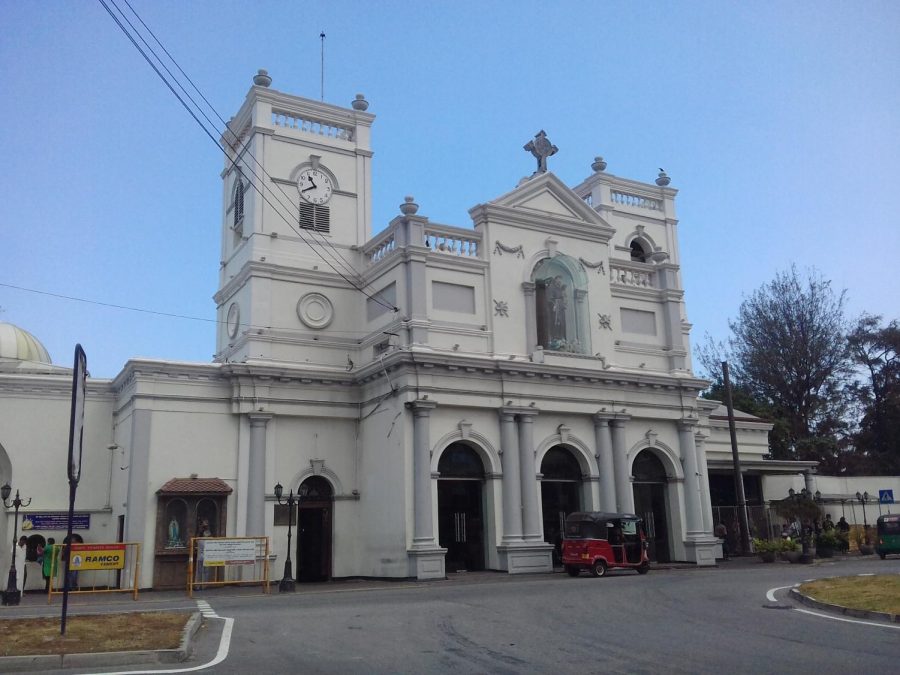Sri Lanka Shows that Christianity is Under Siege
At least 50 people were killed during a bombing at St. Anthony’s Shrine in Sri Lanka on Easter Sunday. It was one of six bombings targeting churches and Western hotels.
April 29, 2019
When I went to Church with my grandmother on Sunday, I was blissfully unaware of the bombings in Sri Lanka until the pastor mentioned it in his sermon. When I checked the news after our service concluded, my head swam after seeing the death toll. Nearly 300 Christians like me, celebrating the Resurrection of our Savior, celebrating a day of life in the face of death, were slaughtered without mercy.
The Sri Lankan government initially assigned blame to the little-known group National Thowheeth Jama’ath, though ISIS has also claimed responsibility. The Sri Lankan Minister of Defense Ruwan Wijewardene has stated that he believes the attack was done in retaliation of the Christchurch shooting, though he presented no evidence to support this claim.
After the service, I felt sickened that someone would kill Christians in their own churches. But what sickened me even more was knowing that this wasn’t an isolated attack against my faith, but rather one of many.
Persecution of Christians Grows Across the Globe
Incidents like the Sri Lanka bombings aren’t anything new; in 2018, four Christians were shot and killed in Quetta, Pakistan on Easter Monday. In 2017, 45 Christians in Egypt were killed by ISIS bombers in the Palm Sunday Bombings. In 2016, the Taliban killed 75 Christians in a bombing in Lahore, Pakistan.
These are only incidents that took place during Easter celebrations in particular, and say little about the constant attacks Christians across Asia and Africa face every day. Christian minorities in Nigeria face persecution from Boko Haram terrorists and the Fulani tribe, who have killed 200,000 people since 2009. When ISIS ruled vast swaths of Syria and Iraq, they committed numerous beheadings and mass executions of minority groups, including Christians.
But it’s not just the Middle East or Africa that have seen the persecution of Christians. China’s atheist state has cracked down on Christian minorities in recent years. It has forced churches to install CCTV cameras so law enforcement can monitor what priests or pastors are telling their congregations. It has shuttered churches and removed their crosses and religious iconography, replacing them with the Chinese flag. It has even attempted to re-write the Bible to make it fit the state’s narrative.
This is not an attempt to discredit the suffering faced by other religious minorities. Like others who are oppressed for their faith, we should express solidarity with Christians facing persecution across the globe. But the reactions we’ve seen in the West have been utterly lacking.
A Lukewarm Sympathy
After the attack, prominent figures in the American public immediately took to social media to express their sympathy for those lost in the attack. But the responses from figures such as Barack Obama, Hillary Clinton, and others all raised eyebrows, namely with their usage of the term “Easter worshippers.”
The avoidance of the term “Christian” after the attack is particularly puzzling, considering that both Obama and Clinton explicitly used the term “Muslim community” when expressing sympathy after the Christchurch shooting.
Also puzzling was their weak response to the perpetrators compared to their previous statements about Christchurch. Clinton was especially tough in her criticism of the shooter, saying that “White supremacist leaders must be condemned everywhere. Their murderous hatred must be stopped.” But her reply to Sri Lanka was far more generic, saying only “We must stand united against hatred and violence.”
What about the “murderous hatred” of Islamic extremists and their leaders? Why no condemnation of the ideology behind these bombings?
Some on the secular left don’t view Christians as victims because they are the majority in the West, and they associate them with colonialism, slavery, and other dark points in Western history. Some might even see the bombings not as unprovoked attacks against a persecuted minority, but as vengeance against historical oppressors. As a result, the persecution of Christians isn’t covered as much as other incidents.
Others might refrain from covering the issue because they believe that focusing too much on the persecution of Christians will shift the focus away from other suffering religious minorities. But this isn’t a zero-sum game; standing with persecuted Christians doesn’t belittle the cause of other persecuted minorities, nor does calling out radical terrorism attack ordinary Muslims. Refusing to act on reality is what led to this attack in the first place.
The truth is, Christianity is under siege across the globe. This is a fact, and not just limited to “far right anger” as the Washington Post puts it. Just as we stand with Muslims, Jews, or others targeted for their faith, we must stand with Christians facing oppression, lest it continues unopposed.








Susan Lewin • May 10, 2019 at 7:55 pm
Well done, Grayson. Thank you for an articulate assessment of a very troubling and very real threat. The future belongs to your generation and we need more people with your courage to speak out.
Catherine Greub • Apr 30, 2019 at 11:07 pm
Wow Gray, really well written! I completely agree with you that Christians are under attack and it is horrible. My priest at the Christian Orthodox church I attend was just talking about the persecutions and increase of atheists as well. Clearly something scary for our future. Please keep writing these controversial articles- love reading them and supporting you!
a forest scout reader • Apr 29, 2019 at 1:38 pm
this is embarassing; please read a book and get over your victim complex